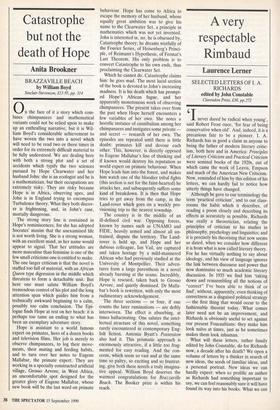Catastrophe but not the death of Hope
Anita Brookner
BRAZZAVILLE BEACH by William Boyd Sinclair-Stevenson, £13.95, pp. 314 0 n the face of it a story which com- bines chimpanzees and mathematical variants could not be relied upon to make up an enthralling narrative, but it is Wil- liam Boyd's considerable achievement to have woven the two into a novel which will need to be read two or three times in order for its extremely difficult material to be fully understood. We are dealing here with both a strong plot and a set of accidents which typify the two sciences pursued by Hope Clearwater and her husband John: she is an ecologist and he is a mathematician, but their occupations are extremely risky. They are risky because Hope is in Africa, observing apes, and John is in England trying to encompass Turbulence theory. What they both discov- er is frightening, and, in John's case, mortally dangerous.
The strong story line is contained in Hope's reminiscences, for she has adopted Socrates' maxim that the unexamined life is not worth living. She is a strong woman, with an excellent mind, as her name would appear to signal. That her attitudes are more masculine than feminine is one of the few small criticisms one is entitled to make. The one larger criticism is that the novel is stuffed too full of material, with an African Queen type digression in the middle which threatens to form a detachable unit. But here one must salute William Boyd's tremendous control of his plot and the long attention span which guides him from a technically awkward beginning to a calm, possibly too calm conclusion. The Epi- logue finds Hope at rest on her beach: it is perhaps too tame an ending to what has been an exemplary adventure story.
Hope is assistant to a world famous expert on primates, hero of a dozen books and television films. Her job is merely to observe chimpanzees, to log their move- ments, their mating and feeding habits, and to turn over her notes to Eugene Mallabar, the primate expert. They are working in a specially constructed artificial village, Grosso Arvore, in West Africa, an uncomfortable , spot designed for the greater glory of Eugene Mallabar, whose new book will be the last word on primate behaviour. Hope has come to Africa to escape the memory of her husband, whose equally great ambition was to give his name to the Clearwater Set, a principle in mathematics which was not yet invented. John is interested in, no, he is obsessed by, Catastrophe theory; he dreams wistfully of the Fourier Series, of Heisenberg's Princi- ple, of Reimann's Hypothesis, of Fermat's Last Theorem. His only problem is to convert Catastrophe to his own ends, thus proclaiming the Clearwater Set.
Which he cannot do. Catastrophe claims him: he goes mad. The most lucid section of the book is devoted to John's increasing madness. It is his death which has prompt- ed Hope's African fugue, . and her apparently monotonous work of observing chimpanzees. The present takes over from the past when Hope herself encounters a few variables of her own. She notes a horrific instance of cannibalism among her chimpanzees and instigates some private — and secret — research of her own. The episodes are repeated until there is little doubt: primates kill and devour each other. This, however, is directly opposed to Eugene Mallabar's line of thinking and if known would destroy his reputation as world expert on primate behaviour. When Hope leads him into the forest, and makes him watch one of the bloodier tribal fights (this section is not for the faint-hearted) he attacks her, and subsequently suffers some kind of breakdown. It is then that Hope tries to get away from the camp, in the Land-rover which goes on a weekly pro- visioning trip to the nearest township.
The country is in the middle of an ill-defined civil war. Opposing forces, known by names such as UNAMO and FIDE, heavily armed and almost all un- trained, dispute the territory. The Land- rover is held up, and Hope and her dubious colleague, Ian Vail, are captured and taken hostage by a mild-mannered African who had previously studied at the University of Montpellier. Their adven- tures form a large parenthesis in a novel already bursting at the seams. Incredibly, Hope is rescued, taken back to Grosso Arvore, and quietly dismissed. Dr Malla- bar's book is rewritten, with only the most rudimentary acknowledgement.
The three sections — or four, if one counts the later ruminations — are deftly interwoven. The effect is absorbing, at times hallucinating. One salutes the intel- lectual structure of this novel, something rarely encountered in contemporary Eng- lish fiction. Antonia Byatt's Possession also had it. This prismatic approach is enormously attractive, if a little too frag- mented for easy reading. And the con- cerns, which seem so vast and at the same time so paltry, so exciting and so frustrat- ing, give both these novels a truly imagina- tive appeal. William Boyd deserves the warmest congratulations for Brazzaville Beach. The Booker prize is within his reach.


























































 Previous page
Previous page